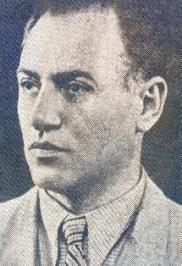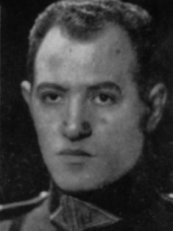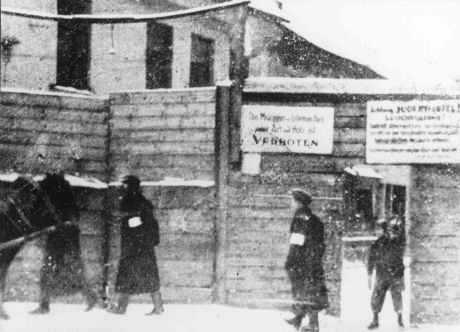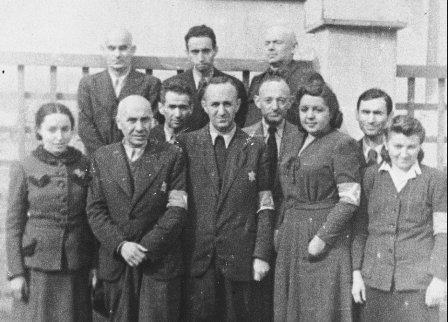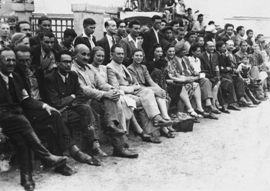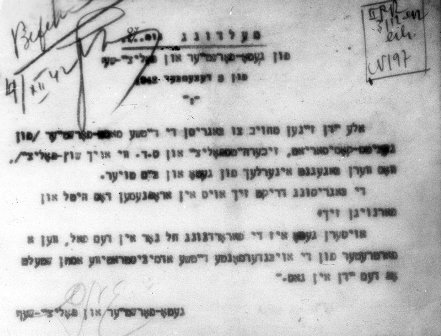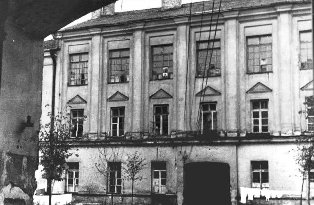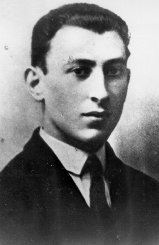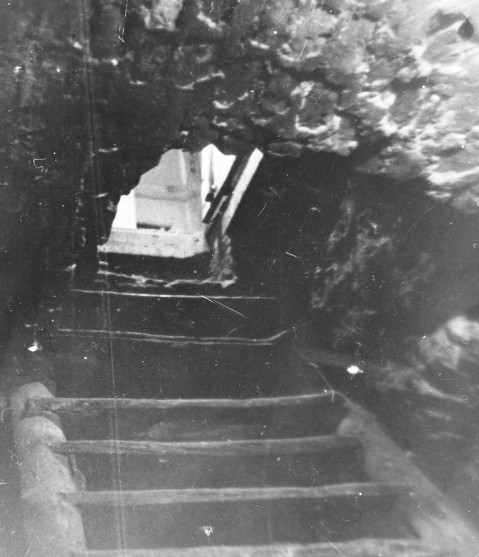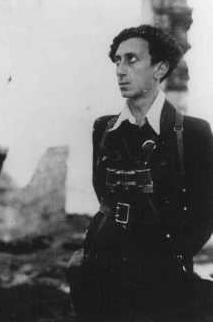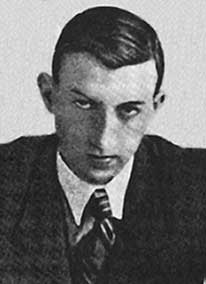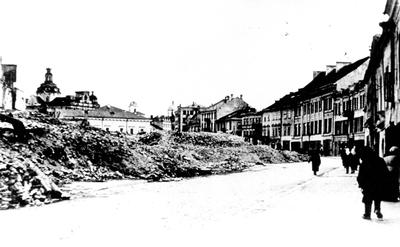Holocaust Education & Archive Research Team |
Ghettos
Introduction to the Ghettos of the Holocaust
Jewish Ghettos The Judenrat Judenrat Leaders Prominent Jews
| ||||||
Jacob Gens The Holocaust in the Vilna Ghetto
Jacob Gens was appointed by the Germans in 1941 to head the Judenrat (Jewish Council) in the Vilna Ghetto. He held this post until Sept 14th, 1943 when he was summoned to the Gestapo headquarters and shot. The Vilna ghetto was completely liquidated 10 days later, this is his story.
Jacob Gens was born in 1903 at the village of Illovieciai in the Siauliai district of Lithuania. to a middle-class Jewish family, the eldest of four brothers. In 1919, when Lithuania was fighting for its independence, he volunteered to serve in the Lithuanian army, and three years later In 1922 married a non-Jewish Lithuanian woman, and became the father of a daughter. Gens had hoped to transfer to the fledgling Lithuanian air force, but that branch of the armed forces only accepted bachelors. Instead he was sent to the front, joining an infantry regiment in the war against Poland, was promoted to the rank of lieutenant and won a decoration.
He served in the army until 1924, and in the same year he enrolled in Kovno University, earning his living as a teacher of Lithuanian and of physical education in the Jewish schools of Ukmerge and Jurbarkas. Three years later he became an accountant in the Ministry of Justice in Kovno, he completed his university studies in law and economics in 1935.
In July 1940 when Lithuania became a Soviet Republic, he was dismissed from his post. As a Zionist who was close to the Revisionists, Gens feared that he was in danger of being arrested in a campaign that was being waged against anti-Soviet elements, and he moved to Vilna, where he was generally unknown. A Lithuanian friend who headed the municipal health department there helped him obtain work as an accountant in the department.
When the Germans occupied Vilna in late June 1941, his Lithuanian friend appointed Gens director of the Jewish hospital. In the beginning of September 1941, two ghettos were established in Vilna in early September 1941. At first, people were moved into either ghetto at random. 29,000 people were incarcerated in Ghetto 1 and 9,000-11,000 in Ghetto 2. Several days after the Jews had moved in, Ghetto 1 was designated for craftsmen and workers with permits, and Ghetto 2 was to be for all others.
The transfer of orphans, the sick, and the elderly from Ghetto 1 to Ghetto 2 began. Those with work permits moved with their families into Ghetto 1. On 7 September 1941, the day after the ghetto relocation began, a new separate Judenrat was established in each of the two ghettos. Anatol Fried, a former director of the community bank, assembled the new Judenrat for Ghetto 1.
The Judenrat for Ghetto 2 was appointed by SD and Security Police in Vilna and was led by Eisik Lejbowicz. Fried, who had been a patient in the Jewish hospital and thus became acquainted with Gens, appointed him as head of the ghetto police.
Gens established the Ghetto police force, and made it into an orderly and disciplined body, and the Germans used this force to assist in the Aktionen that took place in the Ghetto from September to December 1941, in which tens of thousands of Jews were murdered. Gens and his police force had participated in the deportation of Jews to Ponary.
Ghetto chronicler Mendel Balberyszski recorded that Gens told him after the so-called "Old People's Aktion" in July 1942, in which some 84 elderly people were murdered:
"I have no connection with the purge of the elderly. It was an old debt which the Judenrat owed them. They wanted several hundred people, and it was with great difficulty that the `price' was reduced to 100 aged…"
On occasions he had stood at the ghetto gate and personally selected those who were to live and those who were to die. In the Gelbschein Aktionen that took place between 24 October 1941 and 3 November 1941, Gens himself had checked the papers of the Jews as they passed before him, three blue cards to one yellow card.
According to other available evidence, Gens, within the framework of his role, did his best to aid the Jews. He became the predominant personality in the Ghetto and its de facto Governor. His direct contact with the German authorities, bypassing the Judenrat, added to his prestige among the Jews in the Ghetto. Gens involved himself in affairs that had nothing to do with the police, employment, cultural activities and other aspects of Ghetto life. Gens did not easily tolerate autonomous activity within the ghetto. He was especially eager to receive the approval of the intelligentsia for his policies, even when this involved the sacrifice of thousands of Jewish lives. He eagerly accepted the appointment of intellectuals to positions on the Judenrat staff in order to ensure them some sort of livelihood and a modicum of security.
In an attempt to appear not simply a policeman, but an enlightened intellectual, Gens formed a "club" in his home for discussion and debate between a select group of invited guests. Gens' desire to emerge from the war not only as the saviour of the remnant of Vilna Jewry but as custodian of its cultural heritage, continued to the end.
On 15 January 1943, the first anniversary of the theatre's initial performance, Gens said:
How did the idea come up? Simply to give people the opportunity to escape from the reality of the ghetto for a few hours. This we achieved. These are dark and hard days. Our body is in the ghetto, but our spirit has not been enslaved. Our body knows work and discipline today because this maintains the body. The spirit knows of tasks that are harder. Before the first concert they said that a concert must not be held in a graveyard. This is true, but the whole of life is now a graveyard. Heaven forbid that we should let our spirit collapse. We must be strong in spirit and in body…
I am certain that the day of the phrase `Why hast Thou deserted us?' will pass and that we shall still live to see better days. I would like to hope that those days will come soon and in our lifetime."
In July 1942 the Germans dismissed the Judenrat and appointed Gens as head of the Ghetto Administration and sole representative of the Ghetto (Ghettovorsteher), thereby making official his de facto position.
Gens promoted the idea of “work for life” meaning that the survival of the Ghetto’s depended on their work and productivity. He believed that efforts had to be made to gain time and keep the Ghetto in existence until the Germans were defeated, and that this could be achieved by working for the German war effort.
He constantly sought to increase the number of Jews in such positions, in the last few months of the Ghetto’s existence, 14,000 out of the total Ghetto population of 20,000 were employed inside or outside the Ghetto.
On one occasion Gens was ordered by the Germans to send the Vilna Ghetto police to the Oszmiana Ghetto, to carry out a Selektion there and to hand over 1,500 children and women who were not employed. Instead Gens delivered to the Germans 406 people who were chronically ill or old.
Two days later Gens reported to his fellow Judenrat members the thinking behind his actions:
“Today I will say that it is my duty to soil my hands, because terrible times have come over the Jewish people. If five million people have already gone, it is our duty to save the strong and young, not in years only, but in spirit, and not to indulge sentimentality.
When the rabbi in Oszmiana was told and that five elderly Jews were hiding in a ‘maline,’ he said that the ‘maline’ should be opened. That is a man with a young and unshaken spirit. I don’t know whether everybody will understand this and defend it, and whether they will defend it after we have left the Ghetto, but the attitude of our police is this – rescue what you can, do not consider your own good name or what you must live through.
All these things that I have told you do not sound sweetly to our souls nor yet for our lives. These are things one should not have to know. I have told you a shocking secret which must remain locked in our hearts.”
His attitude towards the Ghetto underground was ambivalent, on the one hand he maintained contact with the underground leaders and declared that when the day of the Ghetto’s liquidation arrived, he would join them in an uprising.
The United Partisan Organization (Fareinikte Partisaner Organizatzie or FPO) was formed on 21 January 1942 in the Vilna Ghetto. It took for its motto "We will not go like sheep to the slaughter," a phrase resurrected by Abba Kovner. This was one of the first resistance organizations established in the Nazi ghettos during World War II.
Unlike in other ghettos, the resistance movement in the Vilna Ghetto was not run by ghetto officials. Jacob Gens, appointed head of the ghetto by the Nazis but originally chief of police, ostensibly cooperated with German officials in stopping armed struggle. The FPO represented the full spectrum of political persuasions and parties in Jewish life. It was headed by Yitzhak Wittenberg, Josef Glazman, and Abba Kovner.
The goals of the FPO were to establish a means for the self-defence of the ghetto population, to sabotage German industrial and military activities and to join the partisan and Red Army’s fight against the Nazis.
In early 1943, the Germans caught a member of the Communist underground who revealed some contacts under torture and the Judenrat, in response to German threats, tried to turn Yitzhak Wittenberg, the head of the FPO, over to the Gestapo. Wittenberg was arrested by the Lithuanian police only to be freed by armed FPO members. He went into hiding in the ghetto, and the consensus of the ghetto's population was that 20,000 people should not be jeopardized for the sake of one man.
Wittenberg hid in an attic and at one point dressed in woman's clothes. When the FPO leaders presented Wittenberg with the facts and proposed that he surrender himself, he argued that the ghetto faced liquidation anyway and that armed resistance should begin immediately. Wittenberg convened with the Communist members of the FPO, and they influenced him to agree to give himself up.
The ghetto population, the FPO command and his party comrades were all in favor of his surrender. Wittenberg surrendered himself, and the next morning he was found dead in his cell from cyanide poisoning.
Another example illustrates the nature of Gens' apparent policy regarding the resistance in Vilna. Josef Glazman had been deputy police commandant in the ghetto until Gens dismissed him from that position and appointed him head of the housing department. Glazman was also a founder member and deputy commander of the FPO, and in Gens' opinion, because of this constituted a threat to the stability of the ghetto.
Gens ordered Glazman's arrest on 31 October 1942, but had him released on 5 November. Glazman was dismissed from his post and sent to the labor camp at Sorok-Tatar, but was released after a short time. In June 1943 Glazman was arrested once again; Gens had him sent to a labor camp at Rzesza. Glazman returned to the ghetto about two weeks later, but following the death of Yitzhak Wittenberg, Glazman escaped to the forest, joined the partisans and was killed fighting the Germans.
Gens made this speech to the Brigade leaders on May 15, 1943:
Ladies and Gentlemen! Today I have called you here because there is something I have to tell you! A few days ago I went to the Gestapo and spoke to the Commander of the SD there about the revolvers. I may tell you that he is not at all stupid. He said to me: "
From an economic point of view the ghetto is very valuable, but if you are going to take foolish risks and if there is any question of security, then I will wipe you out. And even if you get 30, 40 or 50 revolvers, you will not be able to save yourselves and will only bring on your misfortune faster."
As long as the ghetto remains a ghetto those of us who have the responsibility will do everything we can so that nothing shall happen to the ghetto. Nowadays a Jew’s whole family is responsible for him. If that is not enough, then I will make the whole room responsible for him, and if even that is not enough – the apartment and even the building. You will have to watch each other, and if there are any hot-heads then it is your duty to report it to the Police. That is not informing. It would be informing if you were to keep silent and the people were to suffer. I am saying this for the brigadiers who are responsible for their brigades. I demand of the brigadiers that they should know their people. In an army an officer must know his men well. And the brigadiers do not know their people. They just have their passes, sit in offices and carry in [smuggle foodstuffs] through the gate. Yesterday for the first time I punished brigadiers because the badges** were not worn properly by their brigades. By nature I am a very lazy man.
I give an order and then I pay no further attention. I gave an order that the badges were to be worn on all garments. Yesterday I remembered this order – and straightaway 35 brigadiers were sitting in the lock-up. Starting tomorrow the brigades will be checked by Levas, and if there is anything that is not in order, then the brigadier will be punished. It is enough that the Police have to act as nursemaids. If the workers do not go to work then the brigadier is trash, he is no use! Once the Germans decided to liquidate the Ghetto, and this process had been set in motion, in August and September 1943, Gens knew that his life was in danger. His Lithuanian wife and daughter were both living in Vilna, outside of the Ghetto.
He had several offers from his Lithuanian relatives and friends to leave the Ghetto and take refuge with them, but he refused, believing that in his role he was engaged in a mission on behalf of the Jewish people.
On September 14 1943, nine days before the final liquidation of the Ghetto, Gens was summoned to the Gestapo, the previous day he had been warned that the Germans were planning to kill him, and had been urged to flee. He replied that his escape would mean disaster for the Jews who remained in the Ghetto.
Gens reported to the Gestapo, as ordered on September 14 and at six pm, he was shot to death in the Gestapo courtyard for maintaining contact with the United Partisans Organisation and for financing its activities. News of his death reached the Ghetto at once, and the Jews who were still alive mourned his passing. Gens belief that if the Ghetto were productive its’ Jews would be saved proved baseless.
But given the terrible conditions prevailing at the time, a view could be formed that he did his best, as he understood it, to save as many Jewish lives as possible.
Sources:
A century of ambivalence: the Jews of Russia and the Soviet Union, 1881 to ... By Zvi Y. Gitelman, Yivo Institute for Jewish Research Kostanian-Danzig, Rachel. Spiritual Resistance in the Vilna Ghetto. (Vilnius: The Vilna Gaon Jewish State Museum, 2002). Testimony of Abram Gerzevitch Suzkever - International Military Tribunal - Nürnberg 1946. The Avengers "A Jewish War Story" -Richard Cohen Knopf 2000 Encyclopaedia of the Holocaust Yad Vashem Moreshet Archives, D. 1.355 USHMM
Copyright Stefan Lundberg and Carmelo Lisciotto H.E.A.R.T 2010
|
